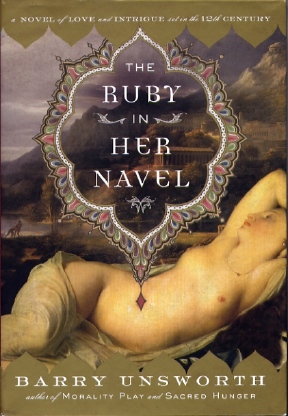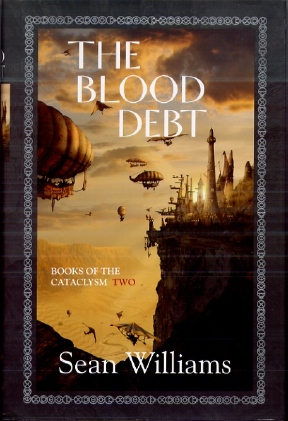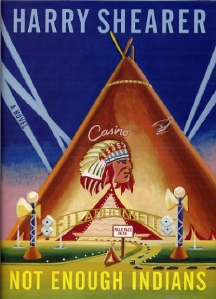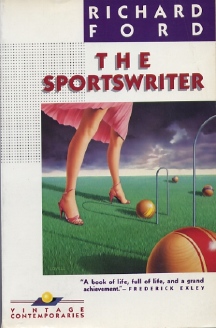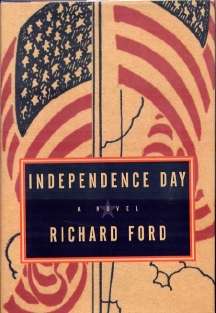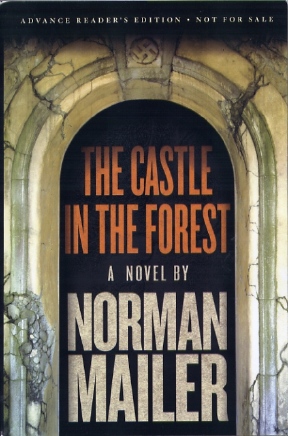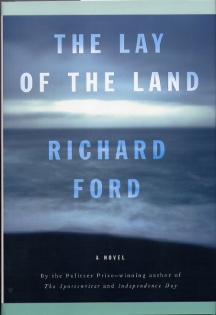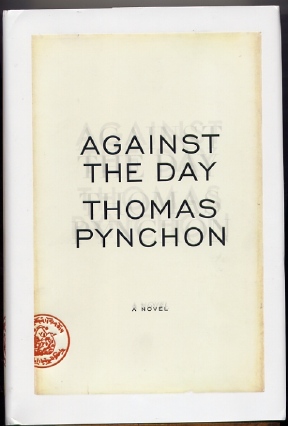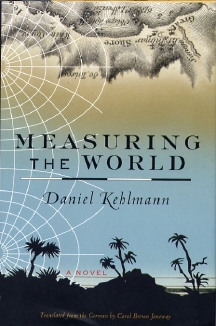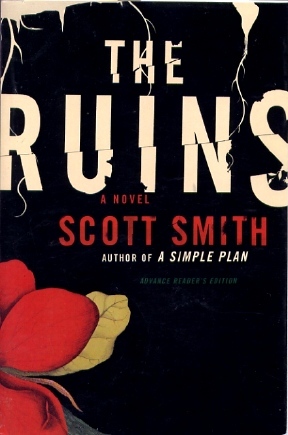|
|
|
This Just In...News from the Agony Column
|
10-27-06: Barry Unsworth Plucks 'The Ruby in Her Navel' |
|||
Today's
News, 900 Years Ago
But no matter what happens to historical time, the human race remains enduringly and endearingly predictable. We'll squabble over land, make up bizarre rulesets to guide our own behavior and then be shocked, shocked, that anyone sensible could even think about violating our so-sensible guidelines. And there are so many little episodes that you can find in history, episodes that will expand upon examination to reveal worlds of the past that mirror our world, conflicts from the past that presage those today, bits and pieces and shards that seem to have fallen from a mirror of tomorrow's headlines. The opportunities then, for a historical writer are pretty much unlimited. No matter what is going on now, no matter how convoluted and original our world seems, how informed by new technologies and new treaties, the old conflicts just keep breaking through. Nobody knows that better than Book Award Long-listed author Barry Unsworth, and he's got 'The Ruby in Her Navel' (Nan A. Talese / Doubleday ; October 17, 2006 ; $26) to prove it. Here's a novel that might have a lot of cross-genre appeal, a mainstream historical novel that could prove quite entertaining to those who enjoy the genre of historical fantasy. Actual history is well known for exceeding the imaginations of men when it comes to weird and strange goings-on. Unsworth is a meticulous author, and he's found a fascinating corner of history to poke about in. 'The Ruby in Her Navel' opens in Palermo, Sicily, in 1149, when the peace secured by King Roger (not King of the Road) is getting more and more uncertain. In Palermo, the Islamic and Christian communities live in harmony. Jews, Arabs, Greeks, and Latin. It's practically New York. Of course this sort of thing cannot last, it never lasts, and as it comes apart, so does the world of Thurstan, just back from the Second Crusade. Not the second Gulf War, no, but so...similar. The terms and types of conflict are different but the passions are the same. For readers of fantasy and of historical fiction, Unsworth offers a glitteringly detailed bit of world-building. It's ever amazing to see how weird the past is, how utterly foreign reality can seem. But Unsworth manages the neat trick of simultaneously immersing us in a weird past but also popping up the cultural and social moirés so that our bizarre history seems rather...modern. Or rather we get a glimpse of how ancient our supposedly cosmopolitan life really is. And as Unsworth undoes the strands of Thurstan's world, he draws the reader deeper into his world with a compelling plot; a compellingly familiar plot. Alas, 'The Ruby in Her Navel' is not likely to show up on genre book lists and not going to be super-visible to readers who stick to the SF-ghetto. And the cover while nice is rather on the generic side. Readers who are looking for historical fiction should find it without any problems, though picking this particular ruby out of the stack of other novels that offer similar themes and cover designs is not going to be easy. But I hope that the fantasy readers, those who enjoy say, Kate Elliot's work, will find a lot to like here as well. Both 'The Ruby in Her Navel' and 'Spirit Gate' have a lot to say about where we live today, and how we decide to do what we do, as individual cogs living our lives in the moments of great nations and as nations, rising and falling, flailing and failing. Sometimes the only way to get a perspective on the here-and-now is to view it from the there-and-then. |
|
10-26-06: Split Personality 101 |
||||||
Harry
Shearer Vs. Sean Williams
Let's start with the familiar, at least to readers of this column, Sean Williams. Williams is one of those writers that I suspect readers will someday twig to en masse and wonder why the hell they weren't rabidly buying his books long, long ago. That said, these "Books of the Cataclysm" are particularly appealing to me, combining as they do big chunks of monsterific horror with a surreal science fictional / fantasy setting and characters from the here-and-now who give us regular folks something to grab on to. Book One, 'The Crooked Letter' set Seth and Hadrian Castillo loose in a wildly-conceived universe chock-a-block with monsters and underpinned by a couple of master's theses worth of religious imagery. Here in 'The Blood Debt: Books of the Cataclysm Two', three friends who inhabit the world created for 'The Crooked Letter' are forced to unite in order to save those whom they love. This involves dealing with a fair number of, you guessed it: monsters. Now, I love monsters, and thus, I love these books, but the whole monster deal is hardly the only thing that is happening here. What makes these books worth reading are not the monsters, but rather Williams' dense, intense prose and his detailed depiction of an afterlife based on a kitchen-sink's worth of religions. This is Clive Barker via Joseph Campbell territory. Should you be the type who enjoys losing yourself in a world of surreal abandon, a world where everything you see is a part of our world put through a seriously intellectual and imaginative mixmaster, then chances are you're going to enjoy these books. Moreover, Lou Anders over at Pyr has done an outstanding job, as usual, making the books themselves something worth fussing over. The books feature big type and big margins, making them easy-to-read. They also have a great design and cover art by Greg Bridges, who apparently has read the books; if he shows you dirigibles, then you can bet you’re going to get dirigibles. Some things, you know are important. Dirigibles. Monsters. Boatloads of research. What more can you ask for? Well, you might not want it in your monster-oriented dirigible-dealing fantasy, but in your comedic novel, you certainly want to laugh. Taking a cue from the upcoming so-called election, you want to laugh early and often. No need to use the electronic laughing machine to do so if you've got comedian Harry Shearer's novel, 'Not Enough Indians'. And it even leaves a paper trail for you in case you didn't remember laughing the first time around. That's why books are such a great technology. They really boil down the essence of what you want and give it to you in an Occam-friendly solution. But back to Harry Shearer...though not seriously, as it is not possible to get past even "The Characters" page of his new novel without laughing out loud, several times. Shearer is noted for lots of stuff, most of it funny. If you've not heard 'Le Show', I can assure you that you cannot even conceive of what you are missing. Shearer's weekly rap for NPR is one of the most peculiar, most surreal, most enjoyable hours you can spend. It includes some very nice skits and bits, including the actually copyrighted "Apologies of the Week". Once you hear this segment, you'll be identifying next week's apologies for the rest of your life. But the immaculately produced skits and bits are connected by some of the most off-the-cuff seeming verbiage– you just can't imagine. But you can listen, here.
Back in Gammage, the town elders, faced with a garbage and sewage tax revolt, decide to spruce up their fiscal woes by declaring themselves an Indian reservation, setting up a casino, then settling back to let the cash come in. Before you can say, "Jack Abramoff", good old Gammage has a Las Vegas impresario and his silicon boosted bimbo putting up cash and a casino. And you, dear readers, have about two out-loud laughs per page, at least by my rather non-generous count. The book is 221 pages, it costs $19.95, let's round down and say you get only(!) 400 laughs, for your twenty bucks, that works out to about a nickel a laugh. Plus you get to keep the book afterwards. Plus, some of those laughs are repeatable and, should you decide to, there's no copy protection on this book to prevent you from loaning it to someone you wish to laugh at a book instead of your own sad state. Of course, said state shall not be so sad should you buy and enjoy both of these very different books. You may feel that you live in a world surrounded by surreal monsters and venal Americans (this presumes that there is a difference), or you may simply feel that you have two more books to add to your fine collection. But mostly what you will have achieved is a state of inconsistency with which to confound and amuse your friends. Let them think you're a weird science fiction reader of Sean Williams, then pop out the funny Harry Shearer novel. Watch them furrow their brows in consternation and when they ask what the hell is the matter with you, hey, that's where I come in. Blame me! I'm inconsistent! |
|
10-25-06: American Empire |
||||||||||||||||
Norman
Mailer, Thomas Pynchon and Richard Ford Lead the Literary Conquest
But there is one thing that is true about the fading empire; it produces artwork of unparalleled quality. With over two hundred years of accelerated progress behind us, our artists, our writers have much to speak about, much to write about. We have generations of writers at our service and even as the American Empire fades, the American Literary Empire...rules. You need look no farther than your local literary section of the bookstore for evidence of this, decades of evidence capped by the latest creations of three of America's most important writers. And while it is easy to equate important with boring, that's not always the case. Sometimes writers get that label because well, they write so compellingly that you literally cannot put their books down. The books keep leaping back into your hands to be read and re-read. In the twilight of our Empire, some writers have captured us so perfectly that they have created their own literary version of the American Empire, in all its diversity, in all its perversity. Three icons of the empire are bringing us new visions of ourselves and as different as the writers are, as different as the works are, they are each uniquely the product of the American Literary Empire. Norman Mailer, Thomas Pynchon and Richard Ford are each publishing new novels, and each novel seems to scale new heights for the writer. While the American Empire fades and burns, these men shine. Norman Mailer is to a certain extent, kind of terrifying. His talent if frightening and his willingness to deploy in any manner he sees fit is equally scary. He's been around for generations; he fought in World War II. He has seen the American Empire reach its peak...and seen it decline. And he has written about every aspect of our climb to and fall from greatness, with a power and verve that has woven itself within the fabric of the society he portrays with such searing veracity. This is why he is so great at what he does, though he is certainly not a writer for every reader. But every writer has a subject that is too difficult to approach, and too compelling to abandon, and Mailer is no exception. For Mailer, that subject is no less than Adolf Hitler. He confesses to having been fascinated with Hitler since he was nine years old, which would have been about the first moments of Hitler's ascent to power. 'The Castle In The Forest' (Random House ; January 27, 2007 ; $26.95) is Norman Mailer's literary vision of Hitler. It is a tale told of a devil, by a devil.
It is a promise well made and well-kept. Mailer is never routine and here he takes a turn towards the American version of magic realism with a novel narrated by a servant of the devil about a man who served the devil well. Yes, there is humor here, so dark it inverts itself into something deeply frightening. There is entertainment to be found here as well, as much as one can be entertained by the presaging of Hell on Earth. But mostly there is passion, American, kick-your-ass-into-the-bleachers passion, as Mailer writes the book that he tells us he has, "wanted to begin for fifty years." Fifty years, mind you, during which the American empire rose to its height and began its decline. And perhaps Mailer had to wait precisely because he needed not the advantage of height but the perspective from below of one who has indeed climbed the heights. It matters not. This book actually, deeply, matters. And it compels you to read it with the sort of magic, the sort of power that only a literary empire can bring to bear.
In the mid-90's, Bascombe came back in 'Independence Day' a novel that won the Pulitzer Prize and the PEN/Faulkner Award for Fiction, and it was like hearing from an old buddy. Like me, Bascombe was embroiled in a new career, a career that was emblematic of the times. Real estate and IT – what could be a better pair than those? Once again, it was the voice, the sheer power of Ford's prose that transported his novel from the world of the written to the world of the personal. I had one hell of a great time with Bascombe back then, even though I did not know I was nearing some sort of high point. And now, Bascombe is back. 'The Lay of the Land' (Alfred A. Knopf / Random House ; November 1, 2006 ; $26.95) finds Bascombe in the year 2000. The country may be in turmoil, but Bascombe's voice, that compelling, guy-you-know-and-just-want-to-shoot-the-shit-with voice is there for me. What happens when we hit middle age and see our lives fragmenting? What do you do with success, failure and everything in between? How do you mingle the personal and the political, the professional and the profound? You pick up 'The Lay of the Land' and spend some quality time with your best literary friend.
It may be the way of empires to crumble and fall, or it may be that they rise again in new forms with new faces. When you live within an empire it's almost possible to understand where it might be within the life cycle of empires. But readers can experience the American literary empire, the towering giants in our midst and understand who they are and why they matter. We can experience the American literary empire both from within the works themselves, in all their glittering, conflicting intensity, and view those works externally, as objects created by a society no less complex, no less conflicted. We can incorporate the reading itself into our daily lives, as we trudge through these days of empire. We go to work each day, or not, then at some point we stop to read a book. We enter our world through these doors. |
|
10-24-06: Daniel Kehlmann is 'Measuring the World' |
|||
One
Size Fits All
None of this would be of much consequence were it not for the fact that 'Measuring the World' is the precisely the sort of book we do not expect from Germany. At 259 small-format pages, it invites reading. But mostly it invites reading by virtue of the fact that wherever you pick it up, you'll encounter invitingly easy-to-read prose that is light, witty and entertaining. As it happens, Kehlmann's post-modern minimalist approach, reminiscent of Chuck Palahniuk, T. C. Boyle and Jennifer Egan, translates so well that it seems not to have been translated at all. It makes on wonder if the same is true of the translated works of Boyle, Palahniuk and Egan. Kehlmann's story starts with historical facts, but told at such a cant that they are transformed into witty and entertaining fiction. The novel follows the stories of two legendary scientists who would seem to be quite the perfect subjects for a turgid, unreadable German novel. Alexander Von Humboldt was an explorer who, at the end of the 18th century, traveled down the Orinoco River, eating poisons, climbing mountains and generally behaving very much in the manner of an old-fashioned, bust-through-the-forest adventurer. Carl Friedrich Gauss was a mathematician who rarely left his rooms, and yet explored the reaches of the universe via a visionary talent that enabled him to run prime numbers in his head. The two men meet in Berlin in 1828, both of them elderly and eccentric. But minds such as these are not destined to fade away, and they find themselves embroiled in the politics of a post Napoleonic Germany. Again, from that description, you'd expect the novel to be in the realm of difficult reading, but the opposite is true. This novel is an absolute hoot, funny, involving and witty. It's pleasantly surreal and direct. I can't imagine any reader picking this up and not getting a chuckle accompanied by a frisson of discovery. Kehlmann says that his influences include the works of Gabriel Garcia Marquez and The Simpsons. I'm not sure that I read those influences in this text. Like Boyle, Kehlmann plays with history in a manner that is cheerfully and entertainingly irreverent. Like Palahniuk, he strips down the story and offers just the facts. And like Egan, he plays with our contextual and textual sensibilities as to what is fact and what is fiction inside and outside the boundaries of the novel. What strikes me as very interesting is that we are potentially seeing the birth of a type of modern fiction that translates well. By stripping out a lot of the trappings of The Novel Thus Far, writers such a Kehlmann are tapping into a style that seems more closely connected to a common sense of story, of storytelling, an amalgam of myth, fairy tale and magic mixed into a dispassionate view of actual events and people. I have no clue if the works of Boyle, Palahniuk, and Egan translate as well as Kehlmann. But I do know that Kehlmann does not seem translated. Obviously, much of the credit is going to go to Carol Brown Janeway, the translator of this novel, and she most assuredly deserves that credit. But I think that there is something deeper happening in the literary world at large. I think that writers around the world, in measuring the world, taking stock of a new set of literary technologies; magic realism, alternate history, science fiction, fantasy, satire as created in the twentieth century and exploited in the twenty first. We're seeing these all tossed into a cultural compactor, where the minds of writers who read translated fiction write fiction to be translated. Somewhere underneath the multiplicity of languages there is a single story. A human story. |
|
10-23-06: Scott Smith's Personal Tour of 'The Ruins' |
|||
Movies, Spoilers, You Name It
So, let me tell you right up front that some part of the way into this interview, I break with my normal tradition, and Smith and I talk in detail about spoilers that will absolutely ruin 'The Ruins', or at least, blunt it a bit. I give you fair warning and all, but there it is. And you know, while I did (and still will, here) go to great lengths not to spoil the novel, now that I think about it, really – you could in theory, know the nub of this novel and still enjoy it because at the end of the day, it's just a finely-written book. Smith's prose is beautifully turned and turned to a purpose that is, simply put, to scare and disturb the bejeebers out of you. And in that regard he rules. But we talk about more than spoilers here, and movie hounds will find this interview of particular interest. Smith, nominated for an Oscar for his screenplay for 'A Simple Plan', became a hot commodity. He worked on lots of projects, most of them, like most movie scripts, in some level of development hell, but nonetheless, at least they’re in that most-highly desirable inferno. We talk about 'El Cid', 'Winter's Tale' and also about why Ben Stiller is associated with a terrorizing number like 'The Ruins'. We also talk about how he created 'The Ruins, and for all Smith's self-deprecation, it's very informative. So, saddle up the RealAudio file, or take the luxurious MP3 file, or as ever, subscribe to the podcast. I warned you about the spoilers, so I'm jettisoning all responsibility should you encounter them. I warn you quite clearly in the interview itself. Ye who complain, after being warned here and in the audio interview, should be so lucky as to go upon your own little hike in the woods, as scripted by the ever-compelling Scott Smith. |
